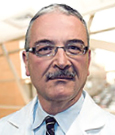Breast cancer expert Massimo Cristofanilli, MD, has been appointed Associate Director for Precision Medicine and Translational Research at the Robert H. Lurie Comprehensive Cancer Center of Northwestern University and Director of Northwestern Onco-SET (Sequence, Evaluate, Treat). Dr. Cristofanilli will also be Professor of Medicine in the Division of Hematology-Oncology at Northwestern University Feinberg School of Medicine.
An expert in translational research and treatment of patients with inflammatory breast cancer, Dr. Cristofanilli will be an integral part of the medical oncology team providing breast cancer patients with the most effective treatment options available at the Maggie Daley Center for Women’s Cancer Care in Prentice Women’s Hospital.
As Associate Director for Precision Medicine and Director of Northwestern Onco-SET, Dr. Cristofanilli will oversee the development of Onco-SET and related clinical and research operations. The program personalizes cancer care for patients by sequencing the individual genetic profile of their tumors and evaluating the results to provide the treatments or clinical trials that will offer the greatest benefit.
Dr. Cristofanilli comes to Northwestern from Thomas Jefferson University and Hospitals, where he served as Director of Jefferson Breast Care Center and Deputy Director of Translational Research at the Kimmel Cancer Center. Previously, Dr. Cristofanilli was Chair of the Department of Medical Oncology at Fox Chase Cancer Center and Executive Director of the Morgan Welch Inflammatory Breast Cancer Program and Clinic at The University of Texas MD Anderson Cancer Center.
“We have the unprecedented opportunity to design a patient-centered, biology-driven model of cancer care combining sophisticated tissue and blood-based molecular diagnostic technologies and innovative treatments,” said Dr. Cristofanilli. “We plan to continue the establishment of strategic partnerships and to involve our patients in an educational and informative journey to advance their understanding of their disease and treatments.” ■


